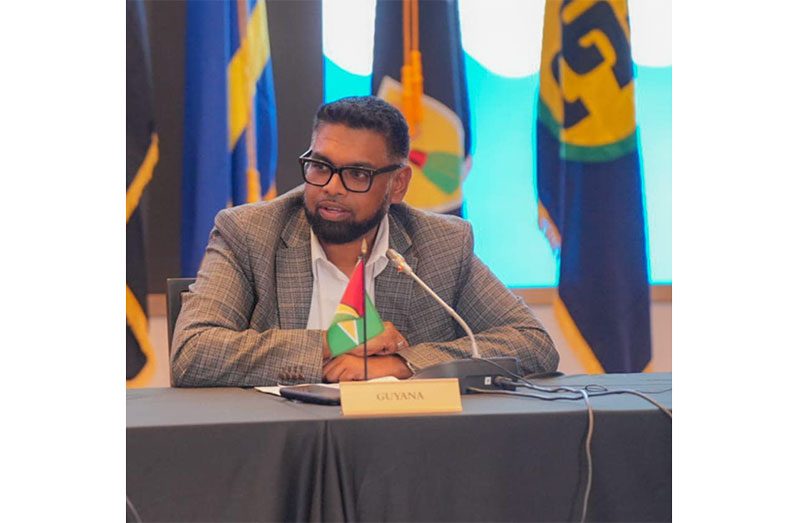–President Ali says comprehensive framework to enhance food security, resilience, and technological innovation
TO strengthen the Caribbean’s food supply chain, ensuring resilience, sustainability, and competitiveness, President Dr. Irfaan Ali on Friday unveiled a comprehensive plan to boost the region’s agriculture sector.
“Given the current situation, we have established a holistic framework through which the industry and a food system must be built to ensure resilience, sustainability and competitiveness,” Dr. Ali, who is the lead Head of Government with responsibility for Agriculture in the CARICOM Quasi Cabinet, told a press conference in Barbados, which concluded a three-day regional summit.
The holistic framework, which aims to overhaul the food systems across the Caribbean the Caribbean’s bold vision to strengthen its food supply with the aim of not only safeguarding food security but also modernising agricultural infrastructure, integrating technological solutions, and increasing participation from youths and women.
This new approach, Dr. Ali explained, is aimed at overcoming the challenges posed by climate change, supply chain disruptions, and the shifting global market landscape.
As part of the strategy, the Caribbean will expand its focus to include not only food security but also technological innovation, increased private sector investment, and greater regional collaboration to tackle common challenges.
“We want to build a food system which encourages young people and women to participate,” he said, underscoring the inclusive nature of the region’s growth strategy.
To this end, the President highlighted six strategic projects developed in collaboration with the Inter-American Institute for Cooperation and Agriculture (IICA) to further enhance the region’s agricultural capacity:
1. CAPACITY BUILDING FOR CARIBBEAN AGRICULTURE EXTENSION SERVICES: Aimed at boosting productivity and rural employment by monetising agricultural extension services across CARICOM.
2. ENHANCING ADAPTIVE CAPACITY OF COASTAL COMMUNITIES’ AGRO-MARINE SYSTEMS: Strengthening coastal community resilience to climate change through integrated agro-marine value chains.
3. ESTABLISHING A DIGITAL FABRICATION LAB (FAB LAB): Aiming to promote technological innovation in agriculture and tourism, with a strong emphasis on youth and women in tech-based agricultural solutions.
4. DIVERSIFYING THE CARIBBEAN FRUIT CROP INDUSTRY: Developing sustainable production models and value-added products to enhance food security in the fruit crop sector.
5. BIO-ECONOMIC MODEL IN ORGANIC WASTE MANAGEMENT: Promoting innovative waste management practices and bio-product generation to strengthen the region’s economy.
6. IMPROVING WATER SECURITY: Enhancing water security for smallholder farmers, helping mitigate climate-related risks to food and nutrition security.
These projects, he stressed, will be crucial in achieving the resilience, sustainability, and competitiveness of the region’s agricultural systems.
CARICOM has outlined several initiatives over the past years to reduce its mammoth US$6 billion food import bill. The aim is to slash this expenditure by 25 per cent by the year 2025.
Dr. Ali pointed out the region has made significant strides with investments in cold storage, farm-to-market access roads, solar drying facilities, and dairy establishments. In addition, private sector investments and lending in agriculture have shown substantial increases, demonstrating growing confidence in the Caribbean’s agricultural future.
These efforts will be further complemented by a new food hub and a digital platform designed to provide farmers with predictive data and real-time information essential for improving agricultural productivity and sustainability.
The region’s modernisation also includes the ongoing construction of a Situation Room and data centre that will offer critical technical support to farmers across the Caribbean.
While the region has made impressive progress despite the devastation caused by natural disasters like hurricanes, floods, and storms, President Ali emphasised the resilience of Caribbean farmers and policymakers in rebuilding and continuing to prioritise food production. “We have been successful in expanding production, notwithstanding these natural disasters,” he said. “Our farmers and policymakers have shown tremendous resilience in reinvesting and ensuring that our focus on increased food production and food security remains a priority for the region.”
Back in July 2024, a Category 4 Hurricane Beryl made landfall on the islands of Barbados, Grenada, St. Vincent and the Grenadines, Jamaica and several others.
Devastating damages to infrastructure were reported in the Grenadines and Grenada, while the fishing industry in Barbados took a ‘beating’, as over 200 vessels were destroyed during the passage of the storm.
This had put a proverbial spoke in the wheel of the region’s progress to meet its food security targets.





.jpg)








